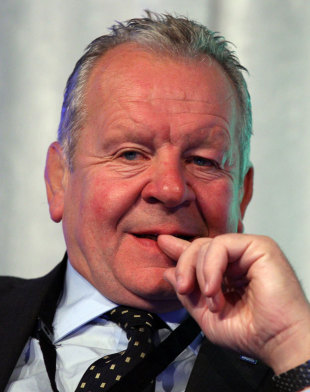|
Comment
Beaumont a victim of changing times
John Taylor
December 14, 2011

Bill Beaumont finds himself on the fringes of the Interntional Rugby Board following his failed bid to become chairman
© Getty Images
Enlarge
It was nothing as grand as a Faustian pact, much more a question of you scratch my back and I'll scratch yours, but in retrospect a bitter Bill Beaumont will wish he had never entered into any kind of reciprocal understanding. In 2007 he voted for Bernard Lapasset to takeover from Syd Millar as chairman of the International Rugby Board on the understanding that he would serve just one four year term with Beaumont as vice-chairman and would then hand over to the Englishmen for the next four years. It was symptomatic of the way the IRB had been run since it was first formed in the late 19th Century. For many years you had to be invited to join (even though it was universally accepted as the world governing body) and it was run as a very exclusive Old Boys Club, meeting once a year at the East India, Devonshire, Sports and Public Schools' Club in St James' Square to sort out whatever needed sorting for the next 12 months. Although it was reconstituted in 1998 with membership opened to every country playing the game and a full time executive to run World Cups and look after the big money that they now generate those walking the corridors of power had not changed very much. The founder members as they were known - England, Ireland, Scotland, Wales, New Zealand, South Africa and France - could still outvote everybody else and control the game. But the times were obviously changing. Most people could see it coming but good old Bill, the only man to come through all the shenanigans going on at Twickenham over the last few months unscathed, has learned a harsh lesson in real-politik. England's 1980 Grand Slam captain might be approaching his 60th birthday but he is still wet behind the ears in the world of sports politics! The chairman of the IRB has become the most powerful man in world rugby and it was very predictable that Lapasset would get a taste for power and want more than one term in office. Why not? Since the first of the new breed of chairman, Vernon Pugh, declared the game open in 1995 there have been just three. He died in office in 2003 and was succeeded by Millar. The Irishman was already acting chairman and claimed he was strictly a caretaker but did not take much persuading when he was asked to stand for a second term.
Lapasset has been very successful and that should have set the alarm bells ringing in the England camp. The release that trumpeted his re-election spelt it all out - Rugby's return to the Olympics, Argentina entering the Rugby Championship in the southern hemisphere, a 10 year global Tests and tour schedule, awarding an Asian country the Rugby World Cup for the first time and a very successful RWC 2011 in New Zealand - pretty impressive. There are now also two Tier 2 representatives, Bob Latham from the USA and Tatsuzo Yabe from Japan, on the executive committee. Lapasset cannot claim all the credit, of course, but as rugby strives to show itself to be a truly global sport this is real progress and major players such as Jacques Rogge, president of the International Olympic Committee, have made it known he is a man they can do business with. In retrospect Beaumont's best course of action would have been to be seen as the man whom persuaded Lapasset to stand again but he apparently spent most of his time in New Zealand shouting 'foul' because Lapasset had reneged on the original agreement - gentleman's handshake is his word and all that! It was a grave misjudgement. When the agreement was allowed to get into the public domain people started comparing the IRB to FIFA - no bribes you understand but definitely a case of Buggins turn - and the shambles at the original meeting a couple of days before the World Cup Final sealed his fate. Once the meeting was reconvened for Los Angeles this week the odds were stacked against him. Not only did he lose out to Lapasset in the vote for chairman he also lost to Oregon Hoskins in the vote for vice-chairman. He remains as member of the executive committee but it is hard to imagine him making a comeback from here. The IRB is still largely controlled by the rugby super powers - if only because they still produce most of the revenue - but there is a realisation that rugby has to become more democratic if it wants to be seen as a global sport and the first steps have been taken in that direction. The next step will be a chairman from Tier 2. It might not happen next time round but I can certainly see the pressure coming on after the World Cup goes to Japan in 2019. If Beaumont had the chance to play his cards again I feel sure he would have played them differently. © ESPN Sports Media Ltd. John Taylor is a former Wales and British & Irish Lions international and currently the managing director of London Welsh
| |||||||||||||||
Live Sports
Communication error please reload the page.
-
Football
-
Cricket
-
Rugby
-
- Days
- Hrs
- Mins
- Secs
F1 - Abu Dhabi GP
Abu Dhabi Grand Prix December 11-131. Max Verstappen ()
2. Valtteri Bottas (Mercedes)
3. Lewis Hamilton (Mercedes)
4. Alexander Albon ()
5. Lando Norris ()
6. Carlos Sainz Jr ()
-
ESPNOtherLive >>
Darts - Premier League
Golf - Houston Open
Snooker - China Open
Tennis - Miami Open

